"I was left behind when the floor was all mopped up."
Earth is destroyed before you, you're the last human in the universe, but you're not Matt Damon from Mars Rescue, no need to think about how to grow potatoes, there's enough rations on the moon base to last you a lifetime, loneliness and nothingness engulfs you ......
Oh no, there's a red giant kangaroo to keep you company, provided you can take a few beatings from it before you call it a brother.
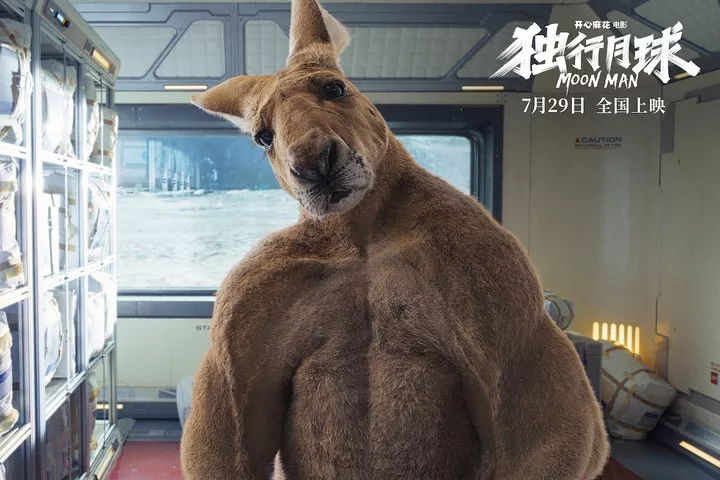
Replace this 'you' with Shen Teng, is this a comedy or a tragedy?
Adapted from Korean cartoonist Cho Seok's work of the same name, Solo Moon is the result of Happy Flower's first attempt at a science fiction comedy, with the "Shen Ma duo" teaming up again after seven years to star in a feature film.
While the buzz and controversy are flying, "Solo Moon" has done well, grossing over 100 million at the box office on demand, 300 million on its first day of release, 1 billion in three days, and 1.3 billion at the current box office, with an opening score of 7.3 on Douban (now down to 6.9).
Back to the movie itself, is Solo Moon actually good?
- (Note: Spoilers below)*
The last human nostalgia
The story takes place in 2033. In order to protect the Earth, mankind deploys the Lunar Shield Project on the Moon, using the Moon as a shield against asteroid impacts. When asteroid π arrives early, the lunar team is evacuated in an emergency. Maintenance worker Doktor Moon (Shen Teng) misses the notification to board the arrow because he rehearses his confession to team leader Ma Lanxing (Ma Li), and becomes the only human left on the moon, and his communication with the team is interrupted.
After dodging a meteor shower that hit the moon and witnessing the asteroid π hitting the earth, Doktor Moon thought that the earth had been destroyed (badly damaged but not destroyed) and that he was not only the moon but also the last human in the universe, he started to live a broken life and became a pair of "brothers" with the kangaroo "Gouzi".

Without Lone Moon's knowledge, his life on the moon was broadcast live in its entirety. Since there is only video footage and no sound, the official commentary is used to establish Dokurotsuki as a hero and give hope to the people of Earth who are rebuilding their home. Many of the 'social death scenes' make Dokugetsu a harmonic star, and the way he tries to live his life after recognizing his current situation carries a heroic quality.
In the end, on the way back to Earth, Dokuroku Moon literally became a hero when he hand-pushed a nuclear bomb to die with π+ in order to destroy the large meteorite π+ left by the asteroid π, which the Earth could not bear.
The film is about two main themes. One is that Doktor Moon, an ordinary man who calls himself 'the in-between', is first portrayed as a hero, then returns to the ordinary on camera, and finally becomes a true hero, both small and great.
The second is the mutual companionship and salvation of the despondent individual and the depressed collective before a common disaster and under different circumstances. And, of course, these two themes echo each other.
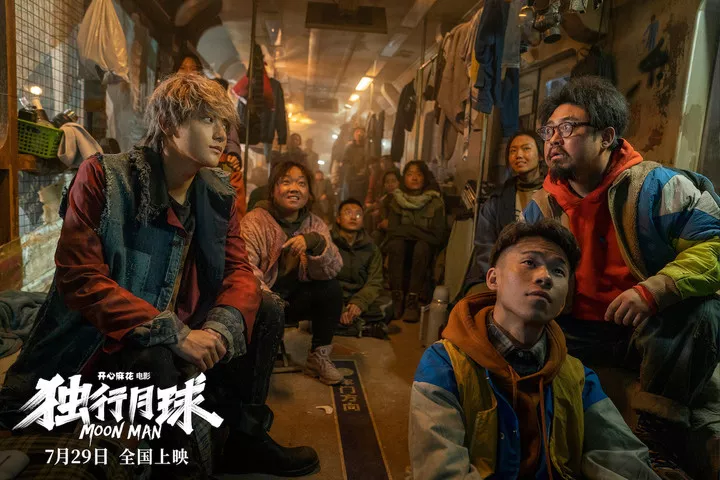
Plot-wise, the film retains the main thread of the original, with less religious and war elements, parallel science fiction and comedy elements, and some local adaptation, especially some mythological metaphors.
On the way to the base of Lake Everest to pick up the engine, in order to drive the rover with solar energy, Doktor Moon chases the sun in his rover based on the speed of the moon relative to the sun, disguising the daylight for longer, with a sense of Quaalude's vintage.
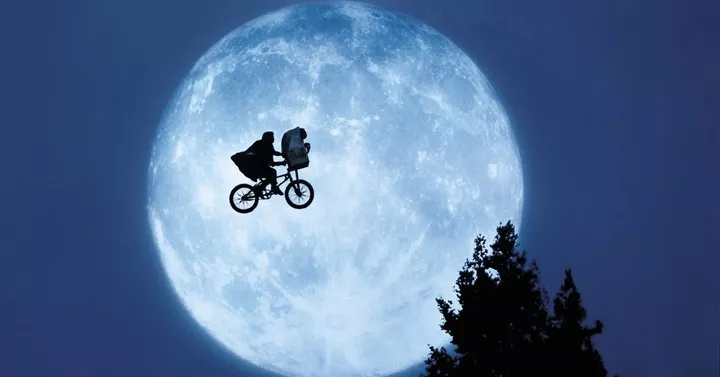
▲ Image from: ET
And when the sun goes down and the moon buggy loses power, the kangaroo pulls a sleigh cart to take Solo Moon to jump the big crater in an extremely romantic scene, like Chang'e running to the moon, like Santa driving a reindeer cart across the moon, or like the boy and the little alien flying in front of the moon on their bikes in ET. Only in Solo Moon, the setting is changed to Earth.
Despite the many moments of alternating hope and despair, Dokugetsu's greatest desire was still to 'go home'.
The opposite of 'Going Home' is the loneliness of 'The Last Human', which is sadly under-rendered, perhaps because of Doktor Moon's comedic vibe, or perhaps because of the kangaroo companionship, but a couple of the episodes are still better.
Initially believing the Earth to be destroyed, Doktor Moon erects a hearth in the window facing the Earth; later, before deciding to kill himself again, Doktor Moon erects a monument to himself to record the last humans on Earth; recurring in the second half of the film is a cover of Country Roads' "The Road Home"; as the sun sets and the rover loses its temperature, a massive sense of desolation comes over the darkness ......
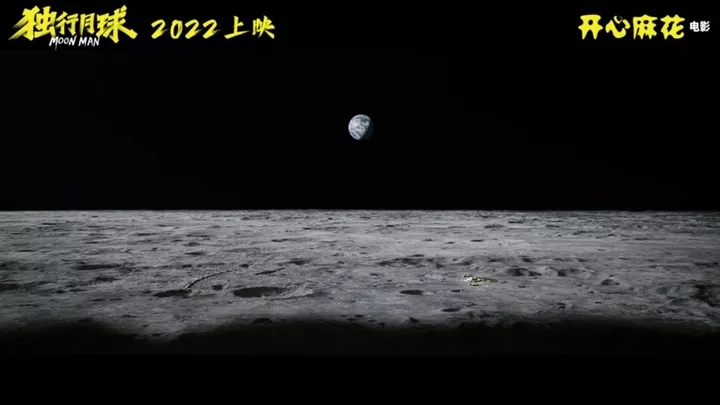
In the flooded universe, human beings and the Earth are just a drop in the ocean. Returning to his homeland, Earth, is still his obsession and even his motivation to stay alive.
It's interesting that Doktor Moon dies trying to save the Earth, the kangaroo returns safely to Earth, but a monument to the kangaroo is erected at the end, even though the human heart honors Doktor Moon by accelerating the construction of the Earth-Moon swing rocket and the moon base is littered with his marks. This again seems to dissolve the previous heroic image, and absurdly, it feels like that's just fine.
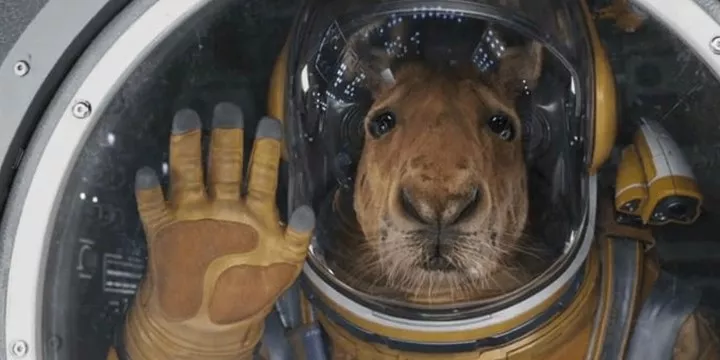
Like Doktor Moon's emphasis on being the 'in-between', he's the ordinary guy with little presence, middle of the road in every metric from size to grades, who eventually perishes and transforms into a ring of stars around the Earth, between the Earth and the Moon, needing no more monuments.
His words to Ma Lansing, "This is the only way to save you, you guys," may be a bit of tenderness on the director's part, as family and personal feelings intertwine to make a flesh-and-blood "half-assed" hero.
A comedy film with sci-fi as a spice
Since it's a sci-fi comedy, it's important to talk about both the sci-fi and comedy aspects.
As a Happy Meal production, "Solo to the Moon" has quite a bit of comedy, but it's not particularly dense, and the second half is largely laugh-out-loud funny, with most of the baggage being slightly boring, such as drinking boiling water with no expression and getting burned in the throat, accidentally falling down the steps in a wheelchair, and pretending to be a mother kangaroo to make a beauty trick on Kongzi ......
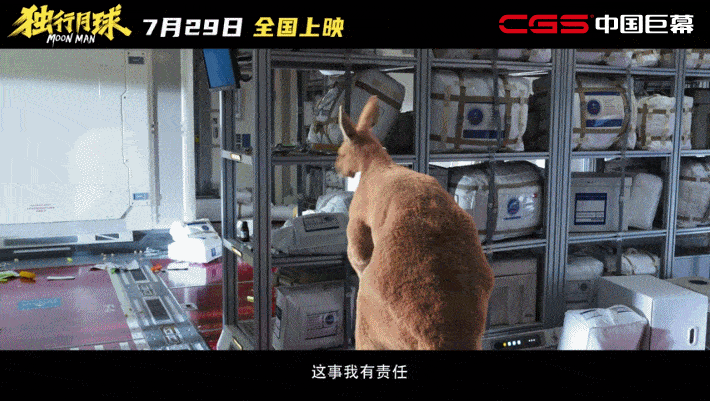
The only hilarious point in my session was when the broadcast first started and no one expected a kangaroo to appear in front of the camera instead of a person, the fast-talking anchor dubbed it "what a meta day" and the rest of the time there was sparse laughter.
And as a sci-fi film, is "Solo Moon" good enough?
Visually speaking, 95% of the film's shots involve special effects, and were done by the domestic VFX company MORE VFX, which is no less impressive than "Wandering Earth". The latter has more than 2,000 shots, 75% of which were made in China, and was done by a team of six VFX companies, one of which was MORE VFX.
Not only the special effects team, "Solo Moon" also inherited the six-axis platform device that "Wandering Earth" had used to simulate the bumps of a lunar rover in its travels. Chinese science fiction films have the initial model of 'passing on' in the field of industrial technology.
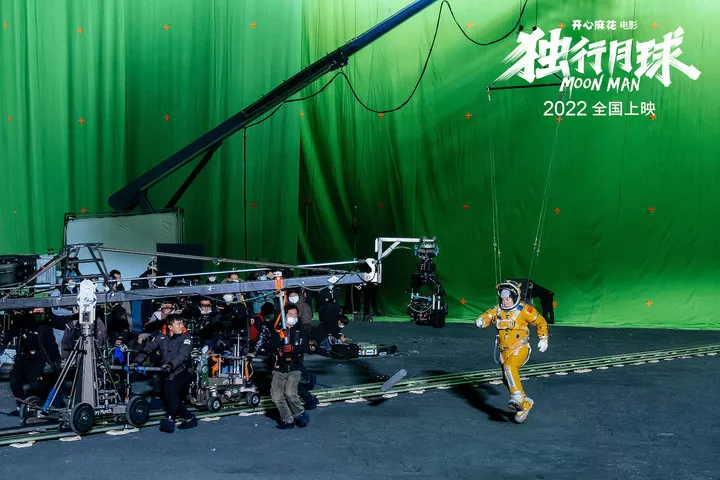
The crew built a 100% live-action lunar base, using 15 studios totaling over 40,000 square meters. 200 tons of sand and gravel were laid in a 6,000-square-meter studio to simulate the real moon dust.
In addition, Kangaroo Kongzi's 'performance' is vivid and realistic, with his image resembling the muscular Australian netizen Roger the Kangaroo, whose appearance is completed by a combination of live action motion capture and special effects, and the actor behind it is Hao Han of Happy Flower.
But there are still quite a few hard hitters in terms of setting.
The Moon Shield team is evacuated in an emergency precisely to avoid a meteorite, but the lone moon is unharmed after the meteor strike; the lone moon is kicked by a kangaroo, leaving two shallow marks in its stomach, and still alive and well; to show that the Earth is not destroyed, people use flashlights and searchlights to illuminate the sky so that not only can the lone moon see the light, but they also tacitly spell out a complete sentence... ...
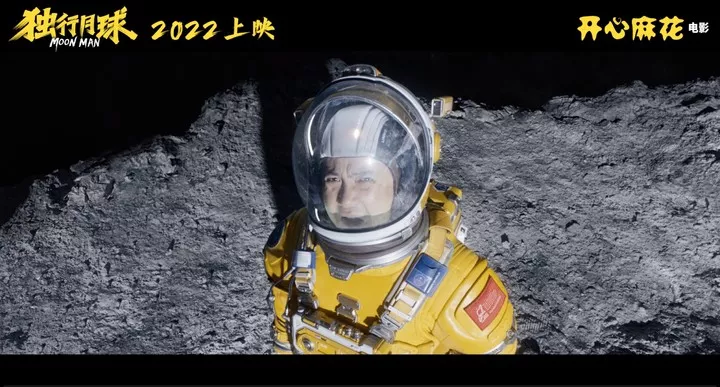
Maybe that's the main character aura, or what's needed to move the plot along.
The comedic elements and sci-fi settings in the movie have some "on and off" feel to them, not to the point of being amazing, but everything is there and the integrity of the story is preserved, as evidenced by the 6.9 Douban rating.
In an interview with Beijing Youth Daily, asked how to grasp the degree of comedy and science fiction, director Zhang Eat Fish replied.
Sci-fi is the shell, and what's inside is really up to us. For example, we have a bowl, which may look very futuristic, but it contains rice that you would normally eat.
"Rice in a futuristic bowl", and some of the movie's sequences do feel that way. The audience understands why it was done, but it's hard to get real without having to delve into the plausibility, like how successful the Moon Shield program was, why the asteroid hit suddenly, and why the scientists had no warning when the second one hit.
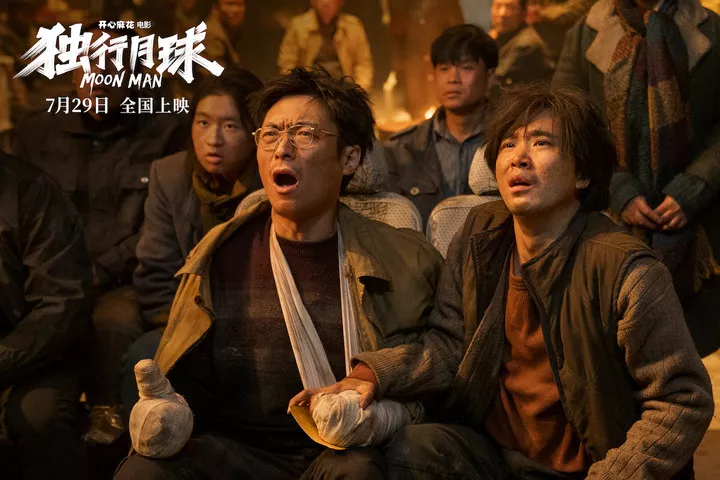
Of course, sometimes it's pointless to get right or wrong. As Song Mingwei, Associate Professor of East Asia at Wellesley College in the United States, has pointed out.
The hard science in science fiction is more a matter of right and wrong, but it is not a parody of reality, but the construction of a heterotopia, an alternative mirror image of reality constructed from logical and sensory structures ...... More important than whether its scientific knowledge is wrong is whether the world it constructs itself is self-consistent.
But the 'self-referential' nature of Solo Moon is accomplished in one set-up after another, with π+ appearing just as Solo Moon returns to the space station, which is why Solo Moon dies a heroic death at the end and the internet spits out comedy hard sensationalism.

▲ Director Chang eats fish.
Meanwhile, while the scenes are about realistic construction and the special effects are taken seriously, the comic book gene, comedic elements and exaggerated performances make LONE RUNNER TO THE MOON less realistic than the director had hoped to achieve.
Chang Eat Fish himself is a fan of anime and was drawn to the absurd comedic overtones of the original manga, so he decided to bring the story to the screen. For him, it was the fun 'comic sense' story he always wanted to make.
The sci-fi genre paved by its predecessors plus a comedy genre that the market just needs, Solo Moon is more like a comedy film with sci-fi spice, the science may not be much more rigorous but sincerely about the warmth and romance of the individual, easing the collective post-apocalyptic anxiety.
Finding domestic sci-fi outside of "Wandering Earth" and "Walk Alone on the Moon
There's a flirtatious reference to Wandering Earth in Solo Moon, and the two films do have subtle commonalities, especially the choice of protagonist at the end.
Similar to "Solo Moon", "Wandering Earth" has the core of Yugong Yishan, and in the midst of the post-apocalyptic redemption, it points to the homeland emotion and family feeling of the nation.
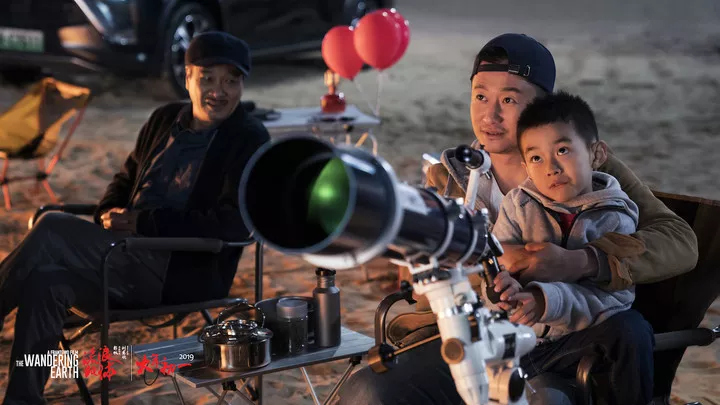
However, after "Wandering Earth" in the 2019 Chinese New Year, it seems that there is no more domestic science fiction movie that is good and popular.
In the same slot as Wandering Earth, Crazy Aliens is an adaptation of Liu Cixin's The Village Teacher. The film itself is a black comedy and earthy sci-fi in the style of Ning Hao, taking the shell of the original and making its own story, satirizing class concepts, cultural differences, and nationalism.

Shanghai Fortress, released in August 2019, is a pseudo-sci-fi romance with a 2.9 Douban rating, but the sci-fi and romance are both incestuous.
The recently released "Mozart from Outer Space," which flopped at the box office and by word of mouth, was tagged as sci-fi, comedy, and family, but was not called sci-fi, just an exploration of generational conflicts under a fantasy veneer, and was far less well-received than "CK7".
Then there's Solo Moon, an adaptation of a Korean comic that's passable in terms of ratings and reviews.
Science fiction discusses a myriad of possibilities about the future, but it is also tied to the times. Others argue that science fiction is not really about the future, but about the present.
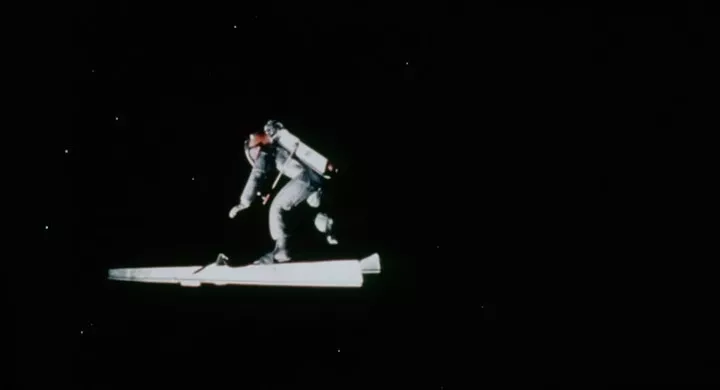
▲ Image from: The Black Planet
In the end credits of the 1974 American science fiction film Black Planet, the astronaut talks to the sentient bomb about life and existentialism, urging it to desist from exploding. .
And Solo Moon tells a story that is both brutal and tender. Ma Lansing knows that 'no one deserves to be sacrificed', but she still abandons Doktor Moon twice; Doktor Moon learns that she's been live for months after communications are restored and just smiles in silence before accepting the status quo, and the Moon's version of Truman's World doesn't end up going dark.
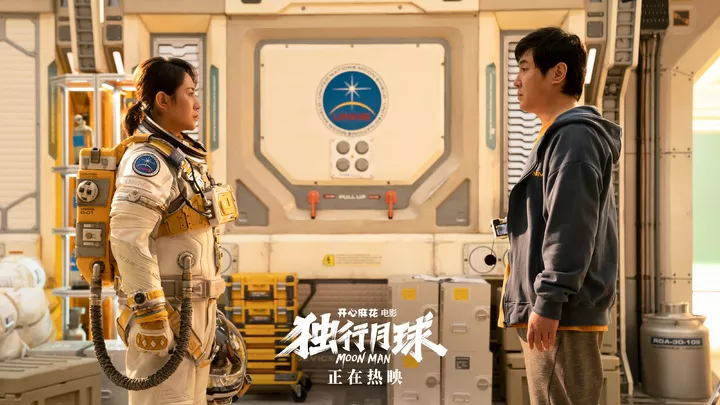
To briefly summarize the mindset of Doktor Moon throughout the film, it starts with the brokenness of coming all the way here, then the loneliness and desolation of having nothing to dissipate, then the ecstasy of returning to human society after communications are restored, and finally moves on to the grand narrative and saving humanity.
The future of domestic sci-fi may be able to escape the trope and have more imagination.
Science fiction writer Hanson once said.
China has long been a large agricultural country, and the rise of a truly sustained science fiction fever was relatively late. The lessons that Western science fiction has taught us are that the creative genre has to be more inclusive, the imagination has to be a bit more liberated, it has to keep up with the frontier developments in science and technology, it has to confront the most untold problems of humanity, and it has to challenge the rules set by its predecessors with a fearless spirit; they are not always right.
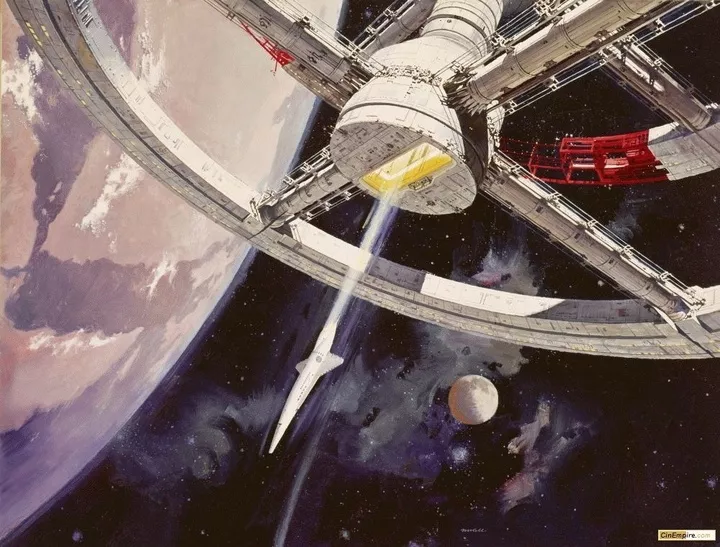
▲ Image from: 2001 A Space Odyssey
2001 A Space Odyssey revels in the 'eternal silence of infinite space', Does the Bionic Man Dream of Electric Sheep has Riker as Sisyphus caught up in the question of the meaning of life, and Mars Rescue is a straightforward look at how an astronaut solves problems in the midst of survival and then returns home as he wishes.
Sci-fi is all encompassing, and can be as grand as discussing the civilization of the universe and the fate of mankind, or as inwardly exploring oneself, as emotionally charged under a hardcore shell, or even as just pointlessly ridiculous. Expect to see more domestic sci-fi films on the silver screen that are different from and more exciting than Solo Moon.